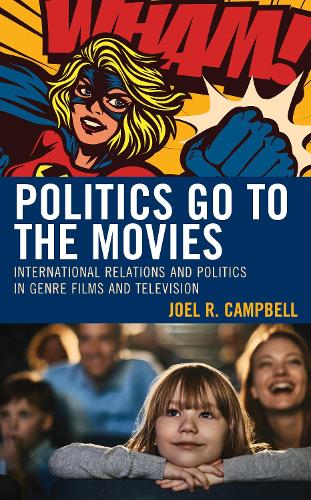
Politics Go to the Movies: International Relations and Politics in Genre Films and Television
(Hardback)
Publishing Details
Politics Go to the Movies: International Relations and Politics in Genre Films and Television
By (Author) Joel R. Campbell
With Daryl Bockett
With Damien Horigan
With Michael Mulvey
With Barry Pollick
With Cord A. Scott
Bloomsbury Publishing PLC
Lexington Books
21st March 2022
United States
Classifications
Professional and Scholarly
Non Fiction
Film: styles and genres
Television: styles and genres
791.436581
Physical Properties
Hardback
408
Width 161mm, Height 227mm, Spine 36mm
794g
Description
Movies and television series are excellent tools for teaching political science and international relations. Understanding how stories in various film and television genres illustrate political ideas can better assist students and fans understand and appreciate the political subtext of these media products. This book will examine five genres and their variants. The first is gangster movies, focusing on American and other organized crime, which reached its zenith in the films of Francis Ford Coppola and Martin Scorsese. Second are political thriller and action movies and television series. Superhero films and TV deal more with modern characters who seek to serve society as they deal with personal struggles and their individual identities. Fourth are war movies, which tend to promote positive images of wars when wars are perceived as successful, but can include antiwar messages when wars turn badly. Fifth are Western movies, which fell out of favor in the 1970s and 1980s, but have undergone a renaissance since the 1990s. Westerns can be taken as either political parables, or as meditations on policing, anarchy, community organization and informal leadership. These genres all offer escape, but can also offer political lessons.
Reviews
This is a creative and effective tool to use film to teach international relations.
--Douglas John Becker, University of Southern CaliforniaThis is an amazing read. I just couldn't put the book down. I've never seen a text that so captivatingly explains the relationship of film genres to politics and international relations. Campbell weaves political theory, film criticism, and history into an appealing mix, while keeping the reader engaged with the unfolding development of five film types--gangster, thriller and action, superhero, war, and western movies. His application of constructivism makes perfect sense, as it captures the constantly shifting dynamics of filmed presentations of political and IR issues. His discussions of women in each genre illustrate how various marginalized groups often are not adequately represented on-screen. Finally, he briefly walks the reader through several other genres, showing how politics can be found in almost any kind of movie. Movies are like time capsules, indicating how we think about society and politics in any era, and this book is one of the best in helping students and the general public better understand how it all works.
--Hieyeon Keum, University of SeoulAuthor Bio
Joel R. Campbell is associate professor of political science in the Pacific Region (Japan and South Korea) in the Global Campus program of Troy University, and teaches in the Masters of Science in International Relations (MSIR) program.
